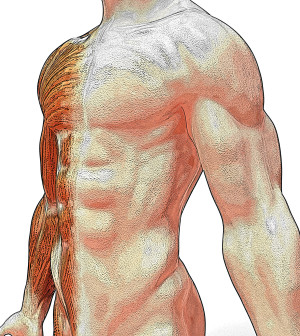- Double Mastectomy May Offer No Survival Benefit to Women With Breast Cancer
- Toxic Lead Found in Cinnamon Product, FDA Says
- Certain Abbott Blood Sugar Monitors May Give Incorrect Readings
- Athletes Can Expect High Ozone, Pollen Counts for Paris Olympics
- Fake Oxycontin Pills Widespread and Potentially Deadly: Report
- Shingles Vaccine Could Lower Dementia Risk
- Your Odds for Accidental Gun Death Rise Greatly in Certain States
- Kids From Poorer Families Less Likely to Survive Cancer
- Tough Workouts Won’t Trigger Cardiac Arrest in Folks With Long QT Syndrome
- At-Home Colon Cancer Test Can Save Lives
Researchers Discover How ‘Magic Mushrooms’ Affect the Brain


When people take the drug known as “magic mushrooms,” their brain shows a pattern of activity that is similar to that seen with dreaming, new research reveals.
British scientists pointed out that their findings are consistent with the vivid yet dream-like states often associated with psychedelic drugs, which include LSD and magic mushrooms. By learning how these drugs work, their possible therapeutic uses can be more fully investigated, the study authors suggested.
“What we have done in this research is begin to identify the biological basis of the reported mind expansion associated with psychedelic drugs,” Dr. Robin Carhart-Harris, from the department of medicine at the Imperial College London, said in a university news release.
“I was fascinated to see similarities between the pattern of brain activity in a psychedelic state and the pattern of brain activity during dream sleep, especially as both involve the primitive areas of the brain linked to emotions and memory,” Carhart-Harris said. “Our findings have, for the first time, provided a physical representation for the experience in the brain.”
The study involved 15 volunteers. These participants were injected with the psychedelic chemical found in magic mushrooms, known as psilocybin. Using functional MRI brain scans, the researchers examined the effects the chemical had on the volunteers’ brains. Brain scans were also performed when the participants were injected with an inactive placebo.
“A good way to understand how the brain works is to perturb the system in a marked and novel way. Psychedelic drugs do precisely this, and so are powerful tools for exploring what happens in the brain when consciousness is profoundly altered,” study lead author Dr. Enzo Tagliazucchi, from Goethe University in Germany, said in the news release.
“It is the first time we have used these methods to look at brain imaging data, and it has given some fascinating insight into how psychedelic drugs expand the mind,” Tagliazucchi noted.
While on psilocybin, the brain network involved in memory, emotion and states of arousal were more apparent. Several areas of the brain involved in this network became more organized and active at the same time. The researchers noted this pattern of brain activity is similar to the pattern associated with dreaming.
Meanwhile, the participants who were given the drug had less coordination in the brain network linked to people’s sense of self and other high-level thinking. These areas of the brain become disorganized and out of synch while under the influence of the chemical, the investigators found.
“We are currently studying the effect of LSD on creative thinking and we will also be looking at the possibility that psilocybin may help alleviate symptoms of depression by allowing patients to change their rigidly pessimistic patterns of thinking,” Carhart-Harris said.
More information
The U.S. National Institute on Drug Abuse provides more information on hallucinogenic drugs.
Source: HealthDay
Copyright © 2024 HealthDay. All rights reserved.










